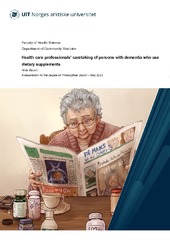| dc.contributor.advisor | Musial, Frauke | |
| dc.contributor.author | Risvoll, Hilde | |
| dc.date.accessioned | 2023-09-28T10:40:12Z | |
| dc.date.available | 2023-09-28T10:40:12Z | |
| dc.date.issued | 2023-10-12 | |
| dc.description.abstract | Persons with dementia experience progressive loss of cognitive functioning and increasing need for help with activities of daily living, including help with administering their prescribed drugs (PD). This thesis describes the use of dietary supplements (DS) (including herbs) by persons with dementia and the risk related to their use, as DS may cause adverse effects. It further describes the awareness of this risk and the attributed responsibility by relevant health care professionals in primary health care. The study methods used were questionnaire-surveys of patients with dementia (n=151), employees in pharmacy (n=105) and home care service (HCS) (n=231), and individual interviews with general practitioners (GPs) (n=14).
Forty-six percent of the persons with dementia used DS and 11% had potentially clinically relevant interactions between DS and PD. Only one-third of the patients received help with the administration of their DS. Several of the patients who did not receive help had cognitive decline, indicating a need for such help. Only one-third of the patients with dementia and half of their caretakers knew that DS may impose a health-risk.
Half of the general practitioners (GPs) and the employees in home care service (HCS), but few pharmacy employees, expressed that they had been worried about patients’ DS use. One-third of the employees in HCS and two-third of the GPs had intervened because of possibly dangerous use. None of the studied health care professionals attributed the responsibility for the safety of these patients to their own profession. The main reason why the GPs did not want to take on the responsibility was the lack of available information about safety, effect and sometimes even DS-content.
Conclusion: DS use are common in patients with dementia and may represent a risk to them, but no group of health care professionals wants to take the responsibility to increase their safety. | en_US |
| dc.description.doctoraltype | ph.d. | en_US |
| dc.description.popularabstract | The use of dietary supplement (DS) (herbs included) is common among patients with dementia and may represent a risk, as DS may have negative interaction with their prescription drugs or cause adverse effects in other ways. However, none of the groups of primary health care professionals perceived themselves as being responsible for safeguarding patients' DS use.
Almost half of the patients with dementia used DS and 11% of these used combinations of DS and prescription drugs that could potentially cause side-effects due to interaction. Only one-third of the patients received help with taking their DS correctly, leaving the rest in risk of misdosing.
Half of the general practitioners (GPs) and the employees in home care service (HCS), but few pharmacy employees, expressed that they have had concerns about patients’ DS use. One-third of the employees in HCS and two-thirds of the GPs had intervened when they discovered potentially dangerous DS use. None of the health care professionals attributed the responsibility for the safety of these patients’ DS use to their own profession, and there was no common agreement on how to increase safe DS use in this vulnerable patient group. | en_US |
| dc.description.sponsorship | Northern Norway Regional Health Authority (Helse Nord RHF)
Sulitjelma og Omeng Sanitetsforening and Bodø Sanitetsforening | en_US |
| dc.identifier.uri | https://hdl.handle.net/10037/31268 | |
| dc.language.iso | eng | en_US |
| dc.publisher | UiT The Arctic University of Norway | en_US |
| dc.publisher | UiT Norges arktiske universitet | en_US |
| dc.relation.haspart | <p>Paper 1: Risvoll, H., Giverhaug, T., Halvorsen, K.H., Waaseth, M. & Musial, F. (2017). Direct and indirect risk associated with the use of dietary supplements among persons with dementia in a Norwegian memory clinic. <i>BMC Complementary and Alternative Medicine, 17</i>(1), 261. Also available in Munin at <a href=https://hdl.handle.net/10037/11835>https://hdl.handle.net/10037/11835</a>.
<p>Paper 2: Risvoll, H., Musial, F., Halvorsen, K.H., Giverhaug, T. & Waaseth, M. (2019). Pharmacy employees’ involvement in safeguarding persons with dementia who use dietary supplements: Results from a survey of Norwegian pharmacies. <i>BMC Complementary and Alternative Medicine 19</i>, 179. Also available in Munin at <a href=https://hdl.handle.net/10037/16646>https://hdl.handle.net/10037/16646</a>.
<p>Paper 3: Risvoll, H., Musial, F., Waaseth, M., Giverhaug, T. & Halvorsen, K.H. (2021). Home care service employees’ contribution to patient safety in clients with dementia who use dietary supplements: a Norwegian survey. <i>Scandinavian Journal of Primary Health Care, 39</i>(4), 403–412. Also available in Munin at <a href=https://hdl.handle.net/10037/23626>https://hdl.handle.net/10037/23626</a>.
<p>Paper 4: Risvoll, H., Risør, T., Halvorsen, K.H., Waaseth, M, Stub, T., Giverhaug, T. & Musial, F. General practitioners’ roles in safeguarding use of dietary supplements among patients with dementia. A qualitative study. (Submitted manuscript). | en_US |
| dc.rights.accessRights | openAccess | en_US |
| dc.rights.holder | Copyright 2023 The Author(s) | |
| dc.rights.uri | https://creativecommons.org/licenses/by-nc-sa/4.0 | en_US |
| dc.rights | Attribution-NonCommercial-ShareAlike 4.0 International (CC BY-NC-SA 4.0) | en_US |
| dc.subject | dementia | en_US |
| dc.subject | dietary supplements | en_US |
| dc.subject | primary health care | en_US |
| dc.subject | patient safety | en_US |
| dc.title | Health care professionals’ caretaking of persons with dementia who use dietary supplements | en_US |
| dc.type | Doctoral thesis | en_US |
| dc.type | Doktorgradsavhandling | en_US |


 English
English norsk
norsk
